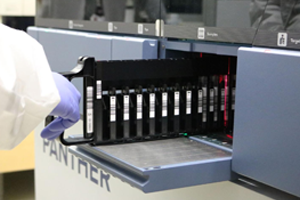When it comes to testing for the novel coronavirus, a lot of terms are thrown around: PCR, antigen, antibody,  rapid. What do all of these mean? How are these tests different, and how do they work? What’s the right kind of test to get?
rapid. What do all of these mean? How are these tests different, and how do they work? What’s the right kind of test to get?
“Lab results provide people important information that they’re anxiously waiting for,” Jane Steckowych, Catholic Medical Center’s laboratory technical operations manager, said in a news release. “The more information we can give patients and providers at once, the better we’ll be able to provide people the care they need.”
At their root, all tests essentially work the same way. A chemical called a reagent reacts with the test sample. That reagent is looking for something to indicate the presence of the virus—whether it’s virus molecules, antigens or antibodies. The reagent will react when it finds what it’s looking for, producing a positive result.
PCR test
PCR stands for polymerase chain reaction. It’s a molecular test, meaning the reagent looks for the genetic material of the virus and reacts with it if found. Samples for the PCR test can be taken from the nose, the nasopharyngeal passage, the mouth or from saliva. Nasopharyngeal swabs generally produce the best sample, though they can be the most uncomfortable.
PCR is a type of nucleic acid amplification test (NAAT) in which the reagent is looking for the virus RNA. RNA is the genetic material of the virus and is very similar to the DNA that humans are made of. In this case, it is specifically looking for the nucleic acid sequence. The sample goes through a process that amplifies, or copies, its genetic material to make it easier to detect.
Shortly after the FDA approved PCR testing, they approved another test method—Transcription Mediated Amplification (TMA). Both tests can both detect very small levels of virus.
According to the news release, Catholic Medical Center has an analyzer called the Panther for TMA tests and an analyzer called the GeneXpert for PCR tests.
The Manchester hospital also partners with Quest Diagnostics to run PCR tests.
These tests take a few hours to produce results, but they are the most sensitive and most reliable for patients who are asymptomatic. Because of this, the test results are often regarded as the “gold standard” of all tests. These tests are also used to confirm the finding of a less sensitive test.
Some rapid PCR tests are available that produce results in about 15 minutes. However, it is a very labor-intensive test. In a standard PCR test, a machine does most of the work once the sample is prepared.
In a rapid test, a lab worker must be very hands-on. Samples have to be run within an hour of being collected, only one can be tested at a time, and the test is less sensitive than PCR performed on analyzers that allow more time for the test reactions to occur.
A positive result on a rapid test is accepted as positive; however, a negative result may need to be validated by running the sample through the longer, more sensitive NAAT, PCR, or TMA process, especially if the patient is showing symptoms.
Antigen test
Another kind of COVID-19 test is called the antigen test. An antigen test looks for the presence of an antigen on the surface of the virus — or the compound that causes the immune system to produce antibodies.
CMC uses the BinaxNOW and Sophia antigen tests in certain, limited settings. Both of these tests produce rapid results. The BinaxNOW test is a small card, which means it can be run in any setting. However, in order for the test to work, the patient needs to be in the first seven days of symptoms. It is not appropriate for a patient who does not have symptoms.
Antibody test
The antibody test looks for COVID-19 antibodies in a sample. Antibodies are produced when the immune system tries to fight a foreign substance, like a virus, and are left behind for a period of time after the virus clears the body. Having antibodies can provide a degree of protection against the virus that triggered them in the first place.
The antibody test “is nice to have but nobody really knows yet what to do with it,” Steckowych said. “We don’t know how long they last or if everybody has the same immune response.”
At CMC
Many factors go into determining what kind of test to use on a patient. Foremost among them are whether a patient is symptomatic or has been exposed to someone with the virus and how quickly a result is needed.
“Another issue we run into is availability of supplies, whether it’s reagent or swabs,” Steckowych said. “Then you also have to juggle what you’re going to test in house and what you’re going to send out (to Quest).”
Certain supplies are allocated by either the government or the company that sells them. This is a way to make sure that each facility receives a fair portion. At times, however, the allocation system can’t keep up with sudden and extreme changes in testing demand.
At CMC, the in-house lab runs PCR tests on pre-operative patients, existing inpatients, and employees who may have been exposed or have symptoms. Most outpatient PCR samples are sent to Quest Diagnostics because of the volume of tests that are requested daily.
“Hundreds of tests of all kinds come each day — the second shift is really busy. We’re also assembling all the testing kits to go out to the sites,” Steckowych said. ”The lab is a very busy area around the clock.
Rapid tests are performed on patients in the Emergency Department and patients transferring into the hospital. This helps the care team appropriately treat them and to know where to place them if they are being admitted.
As published in the Union Leader